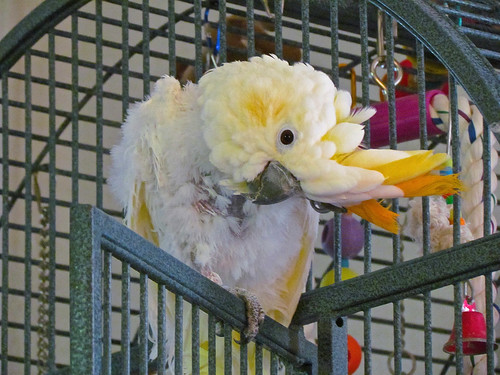 Cockatoos are renowned for their feather destructive behaviour. Image by audreyjm529Caring for your companion can sometimes be disheartening. This is especially true when, no matter what you try, you cannot seem to help them. Carey and James are going through this very scenario with their cockatoo, Kuku.
Cockatoos are renowned for their feather destructive behaviour. Image by audreyjm529Caring for your companion can sometimes be disheartening. This is especially true when, no matter what you try, you cannot seem to help them. Carey and James are going through this very scenario with their cockatoo, Kuku.
Kuku is a 4-year-old sulfur crested cockatoo and has lived with Carey and James since she was 16 weeks old. According to them, she is a very affectionate bird and loves to spend time cuddling with her caretakers. She is rarely caged, spending most of her waking hours in whichever room she finds James or Carey. Neither James nor Carey work outside their home, so Kuku is almost always close by one or both of them.
During the last few months, Kuku, for as yet an unknown reason, has begun to pluck out her feathers. It started as a very occasional occurrence resulting in a few feathers being left in various parts of the house and in her cage. Recently, this behavior has greatly accelerated to the point now where Kuku's chest is devoid of feathers and her wings are not far behind. It saddens both Carey and James to see this behavior, but they cannot seem to stop Kuku no matter what they try.
Here comes the line, say it with me, "Kuku needs to see her veterinarian." This needs to be a veterinarian skilled in avian medicine. It needs to be determined whether Kuku has an underlying disease process that might be causing her to destroy her feathers. There are many possibilities, too many to list here, but an absolute necessity in discovery if we are to help Kuku. If there is no disease process involved, we must then, and I hate this term, "assume" she might be dealing with a behavioral issue.
Cockatoos are noted for being very interactive, highly intelligent birds and, often times, very emotional. These characteristics make them especially loving companions — however they also can lead to behaviors that are sometimes interpreted as attention-getting or obsessive/compulsive, to borrow from the human side. These are not always correct. In Kuku's case, we have no way of knowing what might be going on in her specific case, so I will limit my recommendations here to the aforementioned need for a thorough veterinary evaluation both physically and environmentally, and a behavioral consultation.
In dealing with many multiples of plucking cockatoo patients in the past I will share a common solution that has worked for many patients. This involves keeping the bird stimulated in its environment — enrichment if you will.
Cockatoos in nature are foragers, spending great amounts of time working their environments for food. When we take these highly intelligent animals into captivity and fill up their bowl with food every day, there is not much stimulation involved for them beyond just dipping their heads in a bowl.
With a relatively free-ranging bird like Kuku, by placing food in various locations throughout the house, as well as putting the food inside accessible containers, she can spend part of her day working for her food. This is less time for her to be, for lack of a better term, bored.
The key is keeping her stimulated and thus not plucking. This sounds like I may be oversimplifying Kuku's case, primarily because I likely am, however, there are many plucking cockatoos, as I mentioned, that do indeed respond very well to enrichment of their environment.
Frankly, I hope Kuku's case simply is solved as a behavioral issue and not a disease process. And then that some relatively simple techniques involving environmental enrichment and mental and physical stimulation will eliminate her plucking behavior.